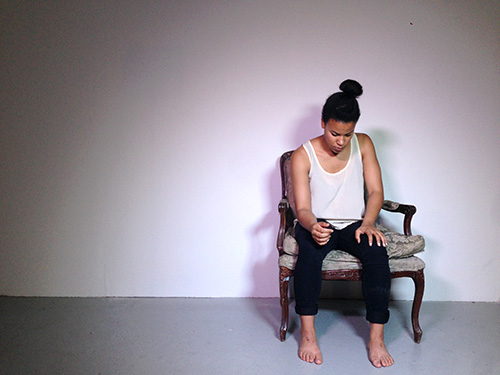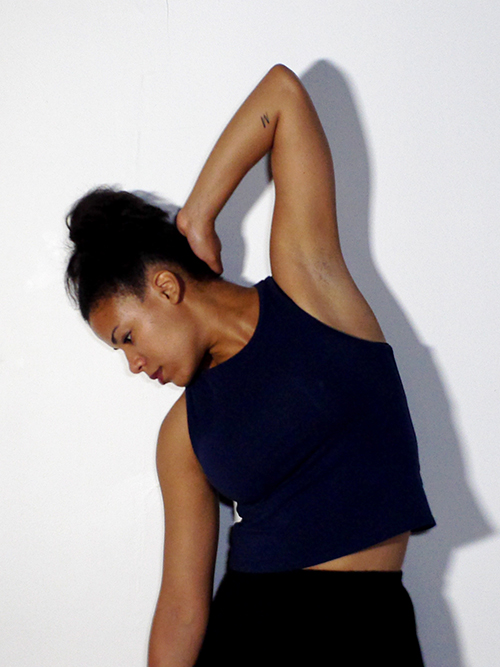Connecting Beyond Demographic
An Interview with Marissa Brown
BY EMMALY WIEDERHOLT
New York based dancer and choreographer Marissa Brown shares her desire to connect through dance and move beyond demographic labels.
~~
Where do you most commonly derive inspiration for your work? From personal, social or political matters (or a mix)?
A big reason I create work is to find connection. I strive to have complete honesty in my work. One of the reasons I dance is that I find movement to be really honest. And the reason I dance in front of people is to find connection. So I’d say I derive my work from more personal matters in order to find connection through communication.
I did a solo work a year and a half ago that was very personal to me, and I feel like I got a response from others that they sensed the courage it took me to perform the piece. They said they felt connected because I was vulnerable. By being vulnerable myself, I hope others will feel permission to find their own openness.
Is it important to you to be identified as a black dance artist and as a female dance artist, or do you see the modifiers as a form of tokenism?
People automatically see me as African American but, actually, I’m mixed. I identify more with being mixed even though, because of my appearance, I’m often put in the category of being African American. Even though I love my background and who I am, I really just consider myself to be an artist. I don’t put anything before or after it. Sometimes I feel those modifiers can be limiting, and I want the work I make to be able to affect all humans. A lot of my work is on the human condition so, even though people can look at me and see it’s coming from a female/African American/young point of view, it’s not important to me to make sure people know those things about me.
Personally, I ask if the work seems interesting. It doesn’t matter from whom its coming. I’ve never really thought about if the audience views my work differently because of who I am. I can only make my work and, if someone doesn’t want to see it because it’s me who made it, then there’s nothing I can do about that.
What changes do you perceive are necessary in the dance world in order to achieve a more universal and diverse representation of voices?
It’s clear some voices aren’t being heard as much as others in the dance world. Forums and festivals that have been created to get more voices out there are definitely a good thing. But because I want the work I create to connect to anyone, I tend to participate in shows that exercise diversity.
That being said, older generations of dance artists have been through a lot more and have felt society’s separations a lot more than I have. I do also have the sense that, as I grow older, I’m more aware of these things. When I was younger, I didn’t think about the fact I was African American. Growing up in California, I was in an accepting community and never felt pushed aside. Race was never on the forefront of my mind. But being in New York, where you can be in a neighborhood that is strongly comprised of one demographic, I’ve become much more aware. Maybe as I get older, I’ll identify more and more with being African American. On the other hand, the fact that I identify as being mixed really changes my point of view. Half my family is white, and the other half is black. I grew up around all of that. So I don’t stand there saying, “I’m black,” because I know both are in me. But definitely I could see that I might feel differently if I had grown up in the 60s.
I hope for people to be able to look at work because of its artistry and what it has to offer as opposed to who’s creating it. Who’s creating work is important, but I think if people are talented, we should embrace anyone making work. We should embrace what people have to offer across the board. That’s what’s important.
What do you hope to contribute to the dance world?
I’m trying to create work that makes people want to be more present, liven their senses, and see we’re all doing this thing called life. I want to connect.
~~
Marissa Brown is originally from the San Francisco Bay Area. She graduated from the University of California Irvine with a BFA in dance performance and choreography. Her work has been shown at various venues in Southern California and in San Francisco, CA. In New York, her work has been shown with the CURRENT SESSIONS, Movement Research, Triskelion Arts, BAX Upstart Festival, IDACO Festival, and as part of the Mare Nostrum Elements Emerging Choreographer Series. Her work has been commissioned for The Assembly, a contemporary dance company located in Orange County, CA. As a performer, she has had the pleasure to work with choreographers and companies such as Donald Mckayle, Benjamin Levy, Brice Mousset, Randy James, Sharp&Fine, The People Movers, The Park Avenue Armory, and Phantom Limb Company.


